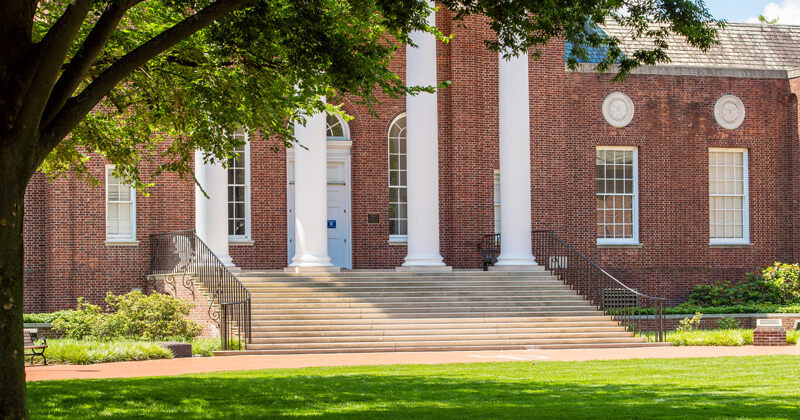The University of Delaware has joined a consortium of universities studying the history of slavery — and such legacies of slavery as segregation and racism — as it relates to their own institutions.
Universities Studying Slavery (USS) consists of about 80 member institutions, most in the United States along with some in Canada, Ireland and the United Kingdom. Based at the University of Virginia, the growing collaboration focuses on sharing best practices and is committed to research, acknowledgement and atonement concerning the universities’ ties to the slave trade and its aftermath.
“The process of studying our own history is multi-faceted, and joining this consortium connects us to other universities that are doing this kind of work,” said Alison Parker, Richards Professor of History and chair of UD’s Department of History. “The primary benefit of being in the consortium is that we can all benefit from the expertise of others.”
At UD, the commitment to study the institution’s ties to slavery grew out of the grassroots Anti-Racism Initiative, which was formed in summer 2020 by faculty, staff and students to address systemic racism throughout the nation. More than 350 faculty, staff and students have joined the initiative and created more than 20 subcommittees.
One of the initiative’s objectives is to study how behavior, culture and history contribute to racism, and the Subcommittee on the Legacies of Enslavement and Dispossession at UD was formed to specifically research that aspect of the subject.
“This is just one of many projects the Anti-Racism Initiative is involved in, but it’s an important one,” Parker said. “We think that, as an institution, it’s essential to study and understand our own history.”
The research involving UD’s history, like the larger initiative, is a University-wide effort and commitment, she said. UD’s application to join the USS consortium was made with the full and formal support of President Dennis Assanis and Provost Robin Morgan.
“To join USS, the entire institution has to be committed to this work, and at UD, it is,” Parker said.
In announcing that UD has joined the consortium, USS said that being part of the collaboration will help the University in its mission of prioritizing racial justice and antiracism work and research. The consortium “allows participating institutions to work together as they address both historical and contemporary issues dealing with race and inequality in higher education and in university communities,” USS said. “Together, the growing movement of schools committed to this work seeks to address the complicated legacies of slavery in the modern world.”
At UD, from summer 2020 through this summer, 21 undergraduate and two graduate students have worked or are continuing to work on uncovering the school’s history. In fall 2021, a newly approved undergraduate/graduate research course, team-taught and cross-listed in several different departments, will allow more students to be involved. Students in this recurring research seminar, “Race and Inequality in Delaware,” will do their own research projects, at first focusing on the UD’s historical ties to slaveholders who founded the University or sold their land to the institution.
This fall, the course will be taught by Dael Norwood and Laura Helton, both assistant professors of history, who will supervise students as they conduct archival research, work with community historians and publicly engage the UD and Newark communities in conversations about the ramifications of past social injustice, Norwood said.
Also in fall semester, Roger Horowitz, adjunct professor of history and director of the Center for the History of Business, Technology and Society at the Hagley Museum and Library, will lead a seminar training students to use oral history interviews to document the historical experiences of African American employees and students at UD, as well as some key Newark community members. Horowitz is collaborating on this project with the founding members of the Delta Sigma Theta sorority at UD.
“Joining Universities Studying Slavery will be helpful to our work, as we look at the different models and approaches that others have taken in their research,” Norwood said. “We want to move forward as quickly as possible, because there’s a lot of enthusiasm for this work, and it’s a big task.”
Research focused on UD is different from some other institutions, particularly in the South where a school may have been literally built by enslaved people, because Delaware’s history is different, Norwood said. The state had a large number of people “in various forms of bondage and indenture,” he said, and so archival records can be more varied and difficult to search out.
Student researchers last spring and this summer “are casting a wide net to see what we can find in preparation for the fall classes and beyond,” he said. The work is attracting not only history majors but students from other disciplines as well.
Research has been and continues to be conducted by students including Callahan Fellows, undergraduates funded by the history department doing independent research projects; Unequal Justice Public History Fellows, a project in which UD is a partner with the Delaware Historical Society; Anti-Racism Initiative undergraduate research assistant Elisa Davila, who has been examining the Land Records files in University Archives; and the initiative’s four undergraduate Summer Research Assistants, who will be working throughout this summer.
In the Anti-Racism Initiative’s announcement of UD having joined USS, the initiative’s co-chairs — K.C. Morrison, professor in the Biden School of Public Policy and Administration; Lynnette Overby, professor of theatre and deputy director of UD’s Community Engagement Initiative; and Parker — noted the importance of research.
“UD recognizes that research universities play a major role in fostering ongoing social change in society and must take the lead in ensuring that we have a fair and equitable society free of racial injustices and racism,” they said in a combined statement.


